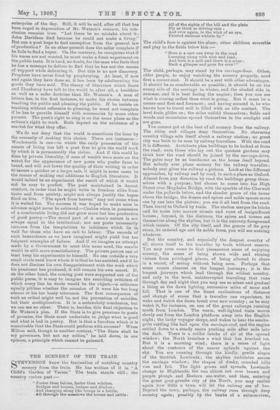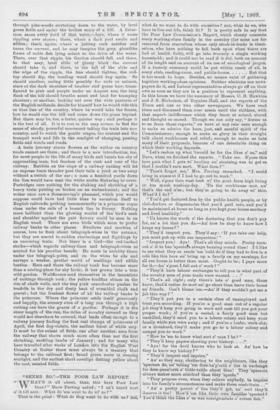THE SCENERY OF THE TRAIN.
STEVENSON knew the fascination of watching country scenery from the train. He has written of it in " A Child's Garden of Verses." The train stands still; the
country rushes past
" Faster than fairies, faster than witches, Bridges and houses, hedges and ditches; And charging along like troops in a battle, All through the meadows the horses and cattle:
All of the sights of the hill and the plain Fly as thick as driving rain ; And ever again, in the wink of an eye, Painted stations whistle by."
The child's face is against the glass ; other children scramble and play in the fields below him :—
" Here is a cart run away in the road Lumping along with man and load ; And here is a mill and there is a river; Each a glimpse and gone for ever !"
The child, perhaps, may stand by the carriage-door. Other, older people, to enjoy watching the scenery properly, need first a corner-seat. It should be a seat with other advantages. It should be as comfortable as possible; it should be on the sunny side of the carriage in winter, and the shaded side in summer, and it is hest facing the engine; then you can see what is coming rather than what is going. But it must be a corner-seat first and foremost ; and having secured it, he who knows how to travel well is filled with an idle content. The level train glides on ; the miles unfold themselves ; fields and woods and mountains spread themselves in the sunlight and are gone.
You cannot get at the best of all scenery from the railway. The cities and villages deny themselves, No charming country village sets itself about a railway station; no great city was built to he seen by railway travellers. With the road it is different. Architects plan buildings to be looked at from the road; even those who lay out the quietest gardens may think how the road should be joined by the carriage-drive. The gates may be as handsome as the house itself beyond. But nobody ever plans scenery for the railway traveller; nobody ever gives the railway a picture. Look at the different approaches, by railway and by road, to such a place as Oxford.
Almost from .any direction by road the buildings group them- selves with a purpose; but choose to come into the High Street over Magdalen Bridge, with the sparkle of the Cherwell under the pollarde below, and the slender grace of the tower above the bridge; the domes and spires and noble spaces move one by one into the picture; you see it all best from the road. Then travel to Oxford by train. The station merges its bricks and its noise into narrow streets and rows of insignificant houses ; beyond, in the distance, the spires and towers set themselves along the skyline, but it is the unlovely foreground which insists. Of the city itself, and the graces of its grey stone, its ordered age and its noble trees, you will see nothing whatever.
But the country, and especially the deepest country of all, shows itself to the traveller by train without reserve. You may oven come to that pleasantest sense of enjoying scenery, the sense of being shown wide and shining visions from privileged places, of being allowed to share in a secret, of seeing without being. seen. Perhaps that sense comes clearest on the longest journeys; it is the
longest journeys which lead through the wildest country, and only in the level, uninterrupted travelling that runs
through day and night that you may see so silent and gradual a thing as the dawn lighting successive miles of moor and hill. That is one of the finest realisations of distance and change of scene that a traveller can experience, to wake and watch the dawn break over new country ; as he may watch it, for instance, on one of the great railways running north from London. The warm, well-lighted train moves slowly out from the London platform away into the English night; the lucky voyager sleeps, and wakes to hear the smoke- grits rattling like hail upon the carriage-roof, and the engine settled down to a steady snore pushing mile after mile into the dark. There is a colder intake of air at the opened window; the North breathes a wind that has touched ice. But it is a morning wind; there is a sense of light about the contours of the nearer uplands against the sky. You are running through the kindly, gentle slopes of the Scottish Lowlands ; the skyline undulates across the carriage window; the shapes of dusky, rounded bills
rise and fall. The light grows and spreads, Lowlands change to Highlands, the suu shines out over brown and purple plough and Eastern sea-water, and then, entering the great grey-granite city of the North, you may realise again how little a town will let the railway see of her. Beyond the town, perhaps, the railway runs through deep country again; possibly by the banks of a salmon-river, through pine-woods stretching down to the water, by level green fields and under the broken scarp of a. bill. A fisher- man scans every yard of that water,—here, where it races rippling over stones ; there, where a dark pool swells and OcIdiee ; there, again, where a jutting rock catches and turns the current, and he may imagine the grey, ghostlike forms of noble fish lying indent to the drive of the water. There, over that ripple, his Gordon should fall, and there, to that easy, level slide of glassy black the current should take it, and there, in the tail of the slide and the edge of the ripple, the lino should tighten, the rod- top should dip, the bending wood should tug. again. So should another, caring little possibly for rods or salmon, stare at the dark stretches of heather and guess how, trans- figured to pink and purple under an August sun, the long flank of the hill should breathe scent and heat for tramping shooters ; or another, looking out over the wide pastures of the English midlands, decide for himself bow be would ride this or that line of the country, where be would take the fences, bow be would rise the hill and come down the grass beyond.
But there may be, too, a lazier, quieter way ; and perhaps it is the best of all. It is to rest in the easy corner, to feel the sense of steady, powerful movement taking the train into new country, and to watch the gentle stages, the content and the tranquil work and life in the sunlight of changing, passing fields and woods and roads.
A train journey shows flowers as the walker on country roads cannot see them; and there is a new introduction, too, for most people to the life of many birds and beasts too shy of approaching man, but fearless of the rush and roar of the railway. Rabbits on the slope of a railway cutting will let an express train thunder past their tails a yard or two away without a twitch of the ear ; a man a hundred yards down the line would have sent the white !mutts flickering to cover.
Partridges care nothing for the shaking and shrieking of a heavy train putting on brakes on an embankment; and the writer once saw a Soemmering's pheasant, which you would suppose could have had little time to accustom itself to English railroads, pecking unconcernedly in a primrose copse close under the rails of a branch line in Surrey. Nothing more brilliant than the glowing scarlet of the bird's neck and shoulder against the pale flowers could be seen in an English wood. There are even birds which seem to prefer railway banks to other places. Swallows and martins, of course, love to flock about telegraph-wires in the autumn, but they are scared to sudden chalterings and flightiugs by an oncoming train. But there is a bird—the red-backed shrike—which regards railway-lines and telegraph-wires as erected for his peculiar benefit. He nests in scrubby thorn under the telegraph-poles, and an the wires he site and surveys a weaker, gentler world of nestlings and edible beetles. Here and there the railway bank has become more than a nesting-place for shy birds; it has grown into a true wild garden. Wallflowers seed themselves ifl the interstices of cuttings through rock ; the yellow toadflax shines on the rim of chalk walls, and the tiny pink convolvulus pushes its tendrils in the dry and dusty heat of crumbled chalk and gravel ; bet the freshest flower of all the railway banks is the primrose. Where the primrose seeds itself generously and happily, the scenery even of a long run through a high cutting can have the graces of a garden. Perhaps it is the sheer length of the run, the miles of country covered as they would not elsewhere be covered, that leads often enough to a railway journey finding the first real clumps of primroses of April, the first dog-violets, the earliest burst of white may. It must be the extent of fields, one after another, seen from the railway that shows much more often than not the first shrinking, suckling lambs of January ; and for many who have travelled after weeks of London into the English West Country at Easter there must always be a memory that belongs to the railroad first; broad green acres in evening sunlight, and the earliest short cowslips dotting yellow about the cool, scented fields.











































 Previous page
Previous page